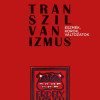Transzilvanizmus. Eszmék, korok, változatok. könyvbemutató kerekasztal-beszélgetés



A teljes lapszám elérhető a folyóirat honlapján.
A tartalomból:
Székely mátrix: azonosságtudat mérés, identitásépítés, történeti emlékezet
Állami beavatkozás - helyi gazdaság: a Fiumei Kereskedelmi és Iparkamara
Purim-spíl a vészkorszak után
Nemzetiségek Szerbiában 1944-1964
Seres Attila dokumentumgyűjteményét Fedinec Csilla mutatja be. A könyvbemutatóról bővebb információ itt található.
A brooklini Academic Studies Press kiadónál megjelent "A patronális demokrácia Ukrajnában és az orosz invázió. Az orosz–ukrán háború" című ukrán nyelvű kötet, benne Fedinec Csilla két tanulmányával. A kötet szabadon hozzáférhető itt
A cikk az ukrán politikai és katonai vezetés viszonyát elemzi az orosz-ukrán háború két éve alatt.
Fedinec Csilla írása a 444-en olvasható.
Egy új, Skandináviától Romániáig húzódó biztonságpolitikai zóna van kialakulóban. Ukrajna már nem feltétlen Kelet és Nyugat, hanem Lengyelország és Románia között válhat híddá. Hogyan viszonyul ehhez a jelenlegi magyar politika és mik lehetnek a következményei?
Intézetünk munkatársa, Marchut Réka, 2024. február 5-én előadást tart Nagykárolyban a Iuliu Maniu emlékére rendezett tudományos szimpóziumon. Előadásának címe: Familia Maniu in mediile interetnice
Filep Tamás Gusztáv írása az 1849. januári eseményekről az orszagut.com-on olvasható.
Pulay Gergely Personalized Value Struggles amid Marketization: The Search for the Good among Men on the Margins of Bucharest című tanulmánya az East European Politics and Societies: and Cultures folyóiratban jelent meg.
Absztrakt
In the most notorious, mixed Roma and non-Roma Romanian neighbourhood of Bucharest, structurally accumulated problems of governance turn into practical challenges that need to be tackled with the means at each person’s disposal. Under conditions of capitalist incorporation and prolonged crises on the post-socialist periphery, the main protagonists of this account—male members of an extended network of Spoitori Roma with diverse livelihoods—strive for relative independence not only from market forces but also from actors who may expose them to abuse. In this article, I reflect on personalized value struggles associated with marketization. Instead of accepting the sectorial divisions between formality and informality, I show how marketization elucidates moral evaluations of being and doing good among men who hope to be or become “their own bosses” in precarious urban conditions. Distinguishing folk and analytic concepts, my analysis engages with the moral contestation of the “good” and the ambiguity of value-based human endeavours among different layers of contemporary economic life.
Zakariás Ildikó, Feischmidt Margit, Gerő Márton, Morauszki András, Zentai Violetta és Zsigmond Csilla Solidarity with Displaced People from Ukraine in Hungary: Attitudes and Practices című tanulmánya a Journal of International Migration and Integration folyóiratban jelent meg.
Absztrakt
The paper explores the attitudes of Hungarian civil society in the context of the war against Ukraine, the active agents of solidarity, and the general social atmosphere associated with welcoming displaced people. Based on a population survey from the summer of 2022, the paper draws an ambivalent picture. First, it highlights the exceptional momentum and mobilising power of civil solidarity both in terms of practical involvement and expressed attitudes. At the same time, the results also reveal the limits and vulnerabilities of civil solidarity—namely, its exposure to populist political discourses which cherish or condemn moral economies of assistance according to vested interests, as well as its embeddedness in a neoliberal reliance on citizens’ individual resources (disposable time and material means), and the salient inequalities in sharing the burdens of humanitarian support. All this reflects that the consensus and relative evenness of solidarity attitudes at the time of our survey were unevenly translated into practical help, burdening those already heavily charged with care responsibilities. With this finding, we underline the importance of exploring solidarity as a complex relationship of attitudes and practices; also, we highlight the need to include the perspectives of care in inquiries of the population’s attitude towards immigrant groups and categories. Our results are drawn from the application of multi-dimensional logistic regression models based on data from a statistical survey involving 1000 respondents representative of Hungary’s adult population.